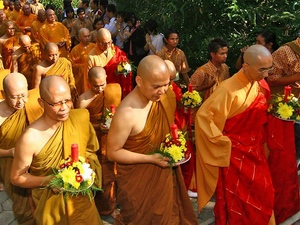
|

 Buddhist holidays - the holidays celebrated within the Buddhist tradition. Buddhist holidays - the holidays celebrated within the Buddhist tradition.
There are many special or holy days held throughout the year by the Buddhist community. Many of these days celebrate the birthdays of Bodhisattvas in the Mahayana tradition or other significant dates in the Buddhist calendar. The most significant celebration happens every May on the night of the full moon, when Buddhist all over the world celebrate the birth, enlightenment and death of the Buddha over 2,500 years ago. It has become to be known as Buddha Day. Buddhist Festivals are always joyful occasions. Typically on a festival day, lay people will go the the local temple or monastery and offer food to the monks and take the Five Precepts and listen to a Dharma talk. In the afternoon, they distribute food to the poor to make merit and in the evening join perhaps in a ceremony of circumambulation a stupa three time as a sign of respect to the Buddha, Dhamma, Sangha. The day will conclude with evening chanting of the Buddha's teachings and meditation. Some holy days are specific to a particular Buddhist tradition or ethnic group (as above). There are two aspects to take into consideration regarding Buddhist festivals: Most Buddhists, with the exception of the Japanese, use the Lunar Calendar and the dates of Buddhist festivals vary from country to country and between Buddhist traditions. There are so many Buddhist festivals, here are some of the more important ones: Vesak: Buddha's Birthday is known as Vesak and is one of the major festivals of the year. It is celebrated on the first full moon day in May, or the fourth lunar month which usually occurs in May or during a lunar leap year, June. In some countries this has become an occasion to not only celebrate the birth but also the enlightenment and parinirvana of the Buddha. Magha Puja: Magha Puja is an important religious festival celebrated by Buddhists in Thailand, Cambodia, and Laos on the full moon day of the third lunar month (this usually falls in March). Buddha's Birthday: Also known as "Hanamatsuri" it is celebrated April 8 and in Japan baby Buddha figurines are ceremonially washed with tea. Asalha Puja Day: Also known as "Dharma Day" celebrates the Buddha's first teaching on the full moon day of the 8th lunar month, approximately July. Uposatha: This day is known as observance day, there are four holy days on the new moon, full moon, and quarter moon days every month. Kathina Ceremony: This robe offering ceremony, is held on any date within the end of the Vassa Retreat. New robes and other requisites can be offered by the laity to the monks. Songkran: This Thai festival goes on for three days during April during which people clean their houses and clothes and sprinkle perfumed water on the monks, novices, and each other. Boat races on the river are also part of the celebration. Loi Krathong: When the rivers and canals are full of water, this festival takes place in all parts of Thailand on the full moon night of the twelfth lunar month. Bowls made with leaves, candles, and incense sticks, are placed in the water, and represent bad luck disappearing. The Ploughing Festival: During the half moon in May, two oxen pull a plough painted gold. Following behind them are girls dressed in white scattering rice seeds. This was to celebrate the Buddha's first moment of enlightenment. The Elephant Festival: The Buddha used an example of a wild elephant which is harnessed to a tame one to be trained. He said that a person who is new to buddhist should have a special relationship with an older Buddhist. This festival takes place on the third Saturday in November. The Festival of the Tooth: In Sri Lanka there is a temple that houses a tooth relic of the Buddha. It can't be seen, but once a year there is a procession for it on the full moon in August. Ulambana: "Ancestor Day" is celebrated from the first to the fifteenth days of the eighth lunar month. This is the day when the monastics complete their Rains Retreat. It was considered that many monastics would have made progress during their retreat and therefore become a greater field of merit. Lay devotees make offerings on behalf of their ancestors and dedicate the merit towards those suffering in the preta realm to relieve their suffering. Avalokitesvara's Birthday: This festival celebrates the Bodhisattva ideal. On the full moon day in March It represents the perfection of compassion in Mahayana traditions of Tibet and China. Bodhi Day: The holiday which commemorates the day that the historical Buddha experienced enlightenment.
Buddhist holidays and festivals in 2025
Buddhist holidays and festivals in 2026 Buddhist holidays and festivals in 2027 Buddhist holidays and festivals in 2028 Place, please link to this page on your web site: Embed this code on your site or blog: Embed this code to forum (BBCode): Direct link to this post: |
|||

On the site Diurnal.ru you can find information about you are interested in religious, public holidays, festivals and memorable dates, horoscopes for today, tomorrow, required date. Everything is sorted by category for your convenience.

